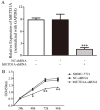Knockdown of Histone Methyltransferase hSETD1A Inhibits Progression, Migration, and Invasion in Human Hepatocellular Carcinoma
- PMID: 27656834
- PMCID: PMC7838640
- DOI: 10.3727/096504016X14648701448011
Knockdown of Histone Methyltransferase hSETD1A Inhibits Progression, Migration, and Invasion in Human Hepatocellular Carcinoma
Abstract
Our aim was to study the expression of human SET domain containing protein 1A (hSETD1A) in hepatocellular carcinoma patients and its relationship with human hepatocellular carcinoma cell function. A total of 30 patients with hepatocellular carcinoma were enrolled in this study. The expression of hSETD1A was detected by real-time polymerase chain reaction (PCR) and Western blotting. The immortalized normal human liver cell line including SMMC-7721 was subjected to real-time PCR for hSETD1A mRNA. Furthermore, hSETD1A-small hairpin RNA (shRNA) was used to knock down hSETD1A expression in SMMC-7721 cells. Cell proliferation, cell apoptosis, and cell migration were determined by CCK8, flow cytometry, and Transwell assays. The positive expression rate level of hSETD1A mRNA and protein in liver carcinoma tissues was 73.33%. hSETD1A knockdown using a specific hSETD1A-shRNA inhibited cell proliferation and promoted cell apoptosis in SMMC-7721 cells. It was also found that downregulation of hSETD1A inhibited cell migration ability but did not affect cell invasion. In conclusion, the expression of hSETD1A occurs at a high rate in hepatocellular carcinoma patients. The expression state of hSETD1A may be a prognostic factor in hepatocellular carcinoma.
Conflict of interest statement
The authors declare no conflicts of interest.
Figures





Similar articles
-
Downregulation of histone methyltransferase SET8 inhibits progression of hepatocellular carcinoma.Sci Rep. 2020 Mar 11;10(1):4490. doi: 10.1038/s41598-020-61402-7. Sci Rep. 2020. PMID: 32161353 Free PMC article.
-
Short hairpin RNA-mediated knockdown of nuclear factor erythroid 2-like 3 exhibits tumor-suppressing effects in hepatocellular carcinoma cells.World J Gastroenterol. 2019 Mar 14;25(10):1210-1223. doi: 10.3748/wjg.v25.i10.1210. World J Gastroenterol. 2019. PMID: 30886504 Free PMC article.
-
[Inhibition of SMYD3 gene expression by RNA interference induces apoptosis in human hepatocellular carcinoma cell line HepG2].Ai Zheng. 2006 May;25(5):526-32. Ai Zheng. 2006. PMID: 16687068 Chinese.
-
SND1 affects proliferation of hepatocellular carcinoma cell line SMMC-7721 by regulating IGFBP3 expression.Anat Rec (Hoboken). 2013 Oct;296(10):1568-75. doi: 10.1002/ar.22737. Epub 2013 Jul 22. Anat Rec (Hoboken). 2013. PMID: 23878061
-
Increased Expression of SETD7 Promotes Cell Proliferation by Regulating Cell Cycle and Indicates Poor Prognosis in Hepatocellular Carcinoma.PLoS One. 2016 May 16;11(5):e0154939. doi: 10.1371/journal.pone.0154939. eCollection 2016. PLoS One. 2016. PMID: 27183310 Free PMC article.
Cited by
-
TIPE‑2 suppresses growth and aggressiveness of hepatocellular carcinoma cells through downregulation of the phosphoinositide 3‑kinase/AKT signaling pathway.Mol Med Rep. 2018 May;17(5):7017-7026. doi: 10.3892/mmr.2018.8789. Epub 2018 Mar 20. Mol Med Rep. 2018. PMID: 29568863 Free PMC article.
-
Potential mechanism of circKIAA1429 accelerating the progression of hepatocellular carcinoma.Infect Agent Cancer. 2025 Mar 1;20(1):12. doi: 10.1186/s13027-025-00645-3. Infect Agent Cancer. 2025. PMID: 40025575 Free PMC article.
References
-
- Bosetti C.; Turati F.; La Vecchia C. Hepatocellular carcinoma epidemiology. Best. Pract. Res. Clin. Gastroenterol. 28:753–770; 2014. - PubMed
-
- Xu J.; Li J.; Chen J.; Liu Z. J. Effect of adjuvant interferon therapy on hepatitis b/c virus-related hepatocellular carcinoma after curative therapy-meta-analysis. Adv. Clin. Exp. Med. 24:331–340; 2015. - PubMed
-
- Ting C. T.; Li W. C.; Chen C. Y.; Tsai T. H. Preventive and therapeutic role of traditional Chinese herbal medicine in hepatocellular carcinoma. J. Chin. Med. Assoc. 78:139–144; 2015. - PubMed
-
- Alsinet C.; Villanueva A. Genomic prognostic markers in hepatocellular carcinoma. Gastroenterol. Hepatol. 35:94–101; 2012. - PubMed
MeSH terms
Substances
LinkOut - more resources
Full Text Sources
Other Literature Sources
Medical
